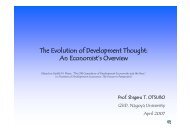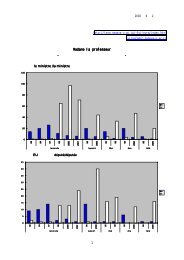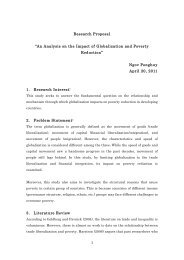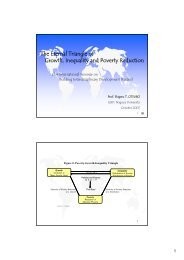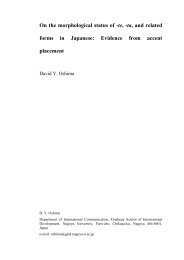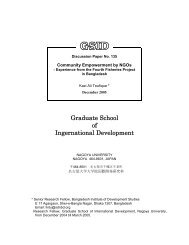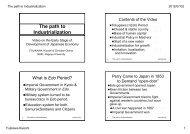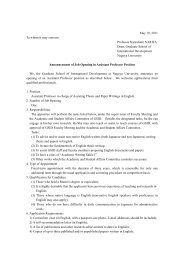Report
Report
Report
Create successful ePaper yourself
Turn your PDF publications into a flip-book with our unique Google optimized e-Paper software.
112 QUANTIFICATION OF BENEFITS FROM ECONOMIC COOPERATION IN SOUTH ASIA<br />
Other Restrictions 4 : In Sri Lanka, there is a need for<br />
development of infrastructure, particularly in the<br />
construction of highways, bridges, railways, roads and<br />
buildings. Sri Lanka has given priority to the<br />
development of infrastructure by encouraging private<br />
participation, both domestic and foreign, through<br />
attractive fiscal and tax concessions such as full tax<br />
holiday, concessionary tax and import duty exemption<br />
on capital goods. It is interesting to note that several<br />
Indian companies have entered the Sri Lankan market<br />
and are engaged in building and civil construction. The<br />
most important investors in residential construction are<br />
the Ansals and SMS Property Developers. Both have<br />
wholly owned subsidiaries in Sri Lanka. The reasons<br />
cited for choosing Sri Lanka are geographical proximity,<br />
initiatives taken by the Sri Lankan government in<br />
attracting Indian investment and demand for housing.<br />
However, the Indian construction companies have faced<br />
many barriers. For instance, a number of clearances<br />
have to be obtained from multiple agencies. Moreover,<br />
the government has failed to provide infrastructure and<br />
other ancillary services required for residential<br />
complexes. Lack of information on the housing market<br />
has made it difficult for the Indian investors to gauge<br />
the demand for housing. However, perhaps the most<br />
limiting factor has been the lack of adequate housing<br />
finance. In the case of civil construction activity, there<br />
is a lack of transparency in the bidding process and<br />
cumbersome safety and environmental regulation poses<br />
added problems. Investors have also pointed out that<br />
they prefer to have a strategic local partner because of<br />
lack of information on the Sri Lankan market.<br />
Difficulties in import of equipment for construction<br />
purposes are also to be a barrier.<br />
As in construction services there are quite a few<br />
restrictions in engineering and architectural services in<br />
Sri Lanka. Although it is not legally binding for an<br />
engineer to register with the institute of engineers of<br />
Sri Lanka (ISEL), there are a few government bodies<br />
such as Colombo municipal council and the urban<br />
development authority that require an engineer to be<br />
registered with IESL. Requirements for architects to<br />
serve in Sri Lanka are laid out by the institute of<br />
architects of Sri Lanka (IASL), which is governed by<br />
the IASL law and is based on international union of<br />
architects (UIA) in Paris. Sri Lankan and other foreign<br />
nationals are allowed to practice in Sri Lanka provided<br />
their degree is recognised in UIA and that they clear<br />
the examination conducted by the IASL. Several foreign<br />
architects work in Sri Lanka, but the requirements to<br />
practice are often violated. Foreign architects, including<br />
Indian architects, either go through the BOI agreed<br />
investments or go for a short term to provide services<br />
on a visitor’s visa.<br />
From South Asia it appears Sri Lanka has received<br />
requests from India to make full commitments under<br />
the Market Access column in architectural and urban<br />
planning and landscape architectural services in Modes<br />
3 and 4. Under the National Treatment column, India<br />
has requested Sri Lanka to remove nationality/<br />
citizenship requirements, if any. India has also requested<br />
Sri Lanka to make additional commitment on MRAs<br />
for qualification and licensing requirements to practice<br />
(use of professional title).<br />
It could be suggested that Sri Lanka may undertake<br />
wider and deeper commitments in the sector covering<br />
all the subsectors and in all related professional services.<br />
It should also undertake commitments in all modes. If<br />
not under the GATS regime then under the regional<br />
arrangement it must do so. Sri Lanka is an important<br />
market at the regional level, being a country with<br />
relatively high per capita income of $1300 in 2006,<br />
which is only next to the Maldives in the region. 5<br />
Bangladesh<br />
In the construction and related engineering services<br />
sector, Bangladesh neither undertook any commitments<br />
during the Uruguay Round nor proposed to so during<br />
the ongoing Doha Round . However, Singapore, the<br />
EU, Japan, Norway and the United States have<br />
requested Bangladesh to open its construction and<br />
related engineering services, and professional and<br />
business services (Raihan and Mahmood 2004: 41-42).<br />
The construction and related engineering services<br />
sector accounts for 8.63% of the Bangladesh’s GDP.<br />
This sector also accounts for three percent of overall<br />
employment in Bangladesh (World Bank 2007) The<br />
sector has been identified as one of the services sectors<br />
of major interest to Bangladesh in which it has been<br />
suggested that it should offer market access<br />
commitments (Raihan and Mahmood 2004). However,<br />
the study also suggests that Bangladesh should follow<br />
4<br />
The discussion in this section is largely based on Taneja, Nisha, Mukherjee, Arpita, Jayanetti, Sanath, and Jayawadhana,<br />
Tilani (2004). Indo-Sri Lanka Trade in Services: FTA II and Beyond, Indian Council for Research on International Economic<br />
Relations (ICRIER), India and Institute of Policy Studies (IPS), Sri Lanka, November 2004.<br />
5<br />
Sri Lanka Data Profile, The World Bank, http://devdata.worldbank.org/external/CPProfile.asp?PTYPE=CP&CCODE=LKA,<br />
last visited on 31 October 2007.




